

In response to the massive hunger crisis the world is facing, Development and Peace — Caritas Canada is launching a new project in Somalia that builds on the work we are currently doing in the country and in other regions. The causes of this worldwide crisis range from climate-related disasters to food shortages and price hikes resulting from local and international armed conflicts.
Last June, the Government of Canada announced that it would allocate $250 million in 2022 and 2023 to help address this global food security crisis, with a focus on sub-Saharan Africa. The first allocation was used to create a $5‑million Humanitarian Coalition matching fund, which allowed us to launch two new projects in Mali and Niger. In September, the government announced the breakdown of the remaining amount, including $14 million for the Canadian Foodgrains Bank. Of this amount, we are receiving over $1.8 million for our new project in Somalia with our partner Trócaire.
A dramatically worsening food crisis
Unprecedented drought in the Horn of Africa is continuing to lead to crop failures, livestock deaths, water shortages, epidemic outbreaks, loss of livelihoods and internal displacement as more and more people search for food and water. In Somalia, this situation is being compounded by persistent internal armed conflict, regional insecurity and international macroeconomic shocks that are leading to people’s ever-diminishing purchasing power.
Last year, families needed approximately $55 a month for food. Now with the price of food and clean water skyrocketing, they need more than $150. What are these families to do now? — Dr. Abdi Tari Ali, Deputy Country Director, Trócaire Somalia
To make matters worse, Somalia is expecting its fifth consecutive failed rainy season this fall, which will further worsen the hunger crisis. Approximately 6.7 million people in Somalia are facing high levels of acute food insecurity — that is, nearly twice as many people as in late 2021. If the projections regarding another failed rainy season prove accurate and humanitarian assistance remains insufficient, the degree of acute malnutrition and hunger-related deaths will soon reach the threshold to declare a famine threatening up to 300,000 people.
On the ground in Somalia
Our partner Trócaire has been working on the ground in Somalia for years providing people with life-saving treatment for severe and moderate acute malnutrition. This year has seen a significant rise in demand for Trócaire’s services, with the number of cases in the first seven months surpassing the annual total of most previous years.


The nutritional status of children in particular is deteriorating, as health facilities continue to report increasing numbers of children being admitted in need of medical intervention due to severe acute malnutrition. — Scott Braunschweig, Program Officer, Development and Peace
Trócaire’s work currently covers the Gedo region, home to 265,000 internally displaced people, who are the most vulnerable to food insecurity. Trócaire is directly providing displaced people and host communities with nutrition services through five district hospitals, one referral hospital, ten primary health units and six health centres, with approximately 250 trained and highly qualified health and nutrition workers.
For one month, we supported Hodhan by giving medical care, including therapeutic milk which cost $120. One hundred and twenty dollars to save a child’s life! — Dr. Abdi Tari Ali, Deputy Country Director, Trócaire Somalia
Reinforced by our recent allocation from the Government of Canada, Trócaire is scaling up its health and nutrition services in Gedo with a project that will address the priority and immediate needs of over 54,000 additional beneficiaries, including over 28,000 children. The services will include the treatment of severe and moderate acute malnutrition for children under 5 and pregnant and lactating women, as well as food vouchers for the households of children treated for severe acute malnutrition to reduce the risk of relapse.
Long-term local solutions
In addition to our emergency responses to provide immediate relief to starving people in Somalia, Mali and Niger, we are supporting projects promoting sustainable domestic food production in, for example, the Sahel and Madagascar in order to prevent future crises. Projects like these are essential in adapting to the growing effects of the climate crisis around the world.
Working together is essential
The global hunger crisis is so massive that no single government or organization can solve it alone. Development and Peace is part of a global effort to end this food security crisis. We are working with our partners and alongside other organizations and governments to ensure that emergency aid is quickly provided to the people who need it now.
Certainly, it will not be possible to tackle the many crises affecting humanity if we do not work and walk together, leaving no one behind. — Pope Francis, message for World Food Day 2022
Please give generously to support our work, and thank you to all our supporters for your great generosity!

